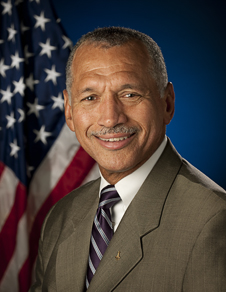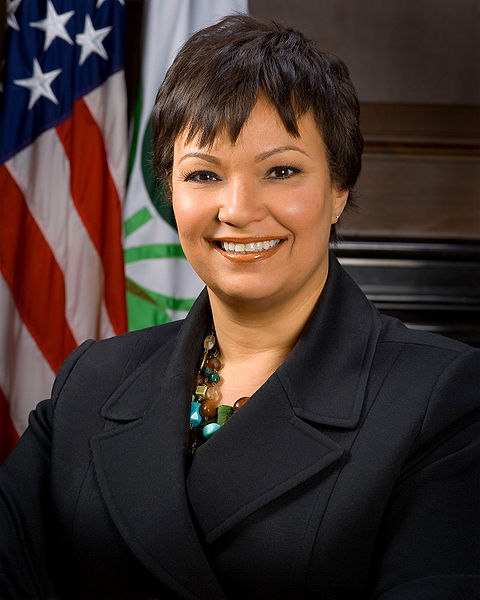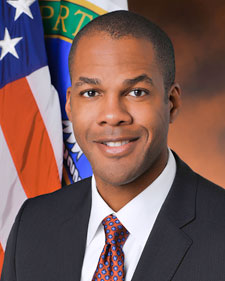Blog Posts Related to the African American Community
Dr. Regina Benjamin's Story: Promoting Health and Wellness for All Americans
Posted by on February 23, 2011 at 9:48 AM ESTEd. Note: This post is part of the Celebrating Black History Month series, which highlights African Americans from across the Administration whose work contributes to the President's goals for winning the future.
As Surgeon General, I am privileged to serve as “America’s Doctor,” providing the public with the best scientific information available on how to improve their health and the health of the nation. I also oversee the operational command of 6,500 uniformed health officers in the Commissioned Corps of the U.S. Public Health Service. These officers serve in locations around the world to promote, protect, and advance the health of the American People.
 I grew up in Daphne, Alabama, and graduated from high school in the nearby town of Fairhope. I received a bachelor’s degree in chemistry from Xavier University in New Orleans and attended Morehouse School of Medicine before receiving my medical degree from the University of Alabama at Birmingham. I later obtained a masters’ degree in business administration from Tulane University in New Orleans. After completing my family medicine residency in Macon, Georgia, I established a clinic in a small fishing village in Alabama to help its many uninsured residents. That clinic in Bayou La Batre is still operating today, despite being destroyed by Hurricane Georges in 1998, Hurricane Katrina in 2005, and a devastating fire in 2006. President Obama nominated me for the Surgeon General’s post in July 2009, and I was confirmed by the Senate for that position in November of the same year.
I grew up in Daphne, Alabama, and graduated from high school in the nearby town of Fairhope. I received a bachelor’s degree in chemistry from Xavier University in New Orleans and attended Morehouse School of Medicine before receiving my medical degree from the University of Alabama at Birmingham. I later obtained a masters’ degree in business administration from Tulane University in New Orleans. After completing my family medicine residency in Macon, Georgia, I established a clinic in a small fishing village in Alabama to help its many uninsured residents. That clinic in Bayou La Batre is still operating today, despite being destroyed by Hurricane Georges in 1998, Hurricane Katrina in 2005, and a devastating fire in 2006. President Obama nominated me for the Surgeon General’s post in July 2009, and I was confirmed by the Senate for that position in November of the same year.Prevention is the foundation of public health, and prevention is the foundation of my work as Surgeon General. If we want to truly reform health care in this country, we need to prevent people from getting sick in the first place, and stop disease before it starts. In the health reform law that was enacted in 2010, Congress created a commission to develop the first-ever national prevention strategy, and named me to chair the commission. The panel, made up of the heads of 17 federal departments and agencies, is providing coordination and leadership at the federal level to ensure that the government is focused on prevention.
Before becoming Surgeon General, I served on the Sullivan Commission, a blue-ribbon panel that looked for ways to diversify the health care workforce. The commission found that, while 25 percent of the nation’s population is minority, only 6 percent of physicians are minorities. That is the same percentage that existed when a similar report was issued in 1910–100 years earlier. Meanwhile, less than 9 percent of nurses are minorities.
Although the nation’s minority populations are increasing, in recent years there has been a downward trend in minority enrollment at our nation’s medical, dental and nursing schools. Unless current trends are quickly reversed, our nation faces a growing ethnic and racial disconnect between those who seek care and those who provide that excellent care.
Dr. Regina Benjamin is the Surgeon General of the United States.
Dr. Eric Goosby's Story: Fighting HIV/AIDS Around the Globe
Posted by on February 20, 2011 at 2:09 PM ESTEd. Note: This post is part of the Celebrating Black History Month series, which highlights African Americans from across the Administration whose work contributes to the President's goals for winning the future.
I live by the motto “To Live and To Serve.” In addition to the great influence of my mother and father, this perspective has led me to a career that has combined my passions for medicine and public service. After
 growing up in San Francisco and attending college at Princeton University, I earned an M.D. at University of California, San Francisco School of Medicine, where I also completed my internship and residency with a fellowship in General Internal Medicine/Infectious Diseases. As a young physician in the 1980s in San Francisco, I found myself in the middle of the emerging AIDS epidemic in America, which became the focus of my career. I now have almost 30 years of experience with HIV/AIDS, ranging from these early years treating patients at San Francisco General Hospital, to engagement at high- level policy leadership. In the Clinton Administration, I served as one of the President’s advisors on HIV/AIDS. As the first Director of the Ryan White Care Act at the U.S. Department of Health and Human Services, I helped develop HIV/AIDS delivery systems in the United States. After leaving government, I joined the NGO Pangaea Global AIDS Foundation as CEO and Chief Medical Officer in 2001, where I turned my focus from the domestic epidemic to the global HIV/AIDS emergency.Learn more about , Foreign Policy, Health Care
growing up in San Francisco and attending college at Princeton University, I earned an M.D. at University of California, San Francisco School of Medicine, where I also completed my internship and residency with a fellowship in General Internal Medicine/Infectious Diseases. As a young physician in the 1980s in San Francisco, I found myself in the middle of the emerging AIDS epidemic in America, which became the focus of my career. I now have almost 30 years of experience with HIV/AIDS, ranging from these early years treating patients at San Francisco General Hospital, to engagement at high- level policy leadership. In the Clinton Administration, I served as one of the President’s advisors on HIV/AIDS. As the first Director of the Ryan White Care Act at the U.S. Department of Health and Human Services, I helped develop HIV/AIDS delivery systems in the United States. After leaving government, I joined the NGO Pangaea Global AIDS Foundation as CEO and Chief Medical Officer in 2001, where I turned my focus from the domestic epidemic to the global HIV/AIDS emergency.Learn more about , Foreign Policy, Health CareNational Black HIV/AIDS Awareness Day: Coming Together to Fight HIV/AIDS
Posted by on February 7, 2011 at 5:05 PM ESTTo commemorate National Black HIV/AIDS Awareness Day, Senior Advisor to President Obama Valerie Jarrett shared her heart-felt thoughts on the importance of combating HIV/AIDS. Watch her video message:
National Black HIV/AIDS Awareness is not just a day to increase awareness, but a day to act on your own health.
- Do you know your status? If not, text your zipcode to 566948 (“KNOWIT”) to find and HIV testing site near you or go to HIVtest.org.
- You can also call 1-800-CDC-INFORMATION for more information and testing sites in your area.
- Visit www.aids.gov for Federal resources, events in your area and tools to commemorate National Black HIV/AIDS Awareness Day.
Learn more about , Civil Rights, Additional IssuesCharles Bolden's Story: "From the Segregated South to Low Earth Orbit"
Posted by on February 6, 2011 at 12:07 PM ESTEd. note: This post is part of the Celebrating Black History Month series that highlights the contributions of African Americans who are contributing to the President's vision of winning the future though their work.
It's a long way from the segregated south to low Earth orbit. But I am fortunate to have made the journey and to have had many opportunities to serve my nation in a 34-year career with the U.S. Marine Corps and in many roles at NASA, currently as head of the nation's space program.
 When I was a young man, my service as NASA's first African American Administrator under the Nation's first Black president would have been nearly unthinkable. But through the efforts of many people of all races, our nation has changed. And, thanks to the Space Shuttle Program, and NASA's cross-disciplinary exploration missions, African Americans and many others have had access to space and also to science and technological careers. The shuttle was really instrumental in breaking the color barrier for African Americans in space, and it all happened without a single law being passed.
When I was a young man, my service as NASA's first African American Administrator under the Nation's first Black president would have been nearly unthinkable. But through the efforts of many people of all races, our nation has changed. And, thanks to the Space Shuttle Program, and NASA's cross-disciplinary exploration missions, African Americans and many others have had access to space and also to science and technological careers. The shuttle was really instrumental in breaking the color barrier for African Americans in space, and it all happened without a single law being passed.Today, African Americans are scientists, engineers, and astronauts. They're developing instruments for spacecraft to peer beyond the edge of our solar system and opening solar arrays on the International Space Station with just a tether holding them to a vehicle moving nearly 17,000 miles per hour. NASA is reinvigorating its focus on research and development to develop technologies that don't exist today. We will send humans farther and faster into space. We'll visit places we've never been, with people and robots, launch science missions to uncover unfathomable secrets of the universe, and make air travel safer and cleaner here on the home front. African Americans have been, and will continue to be, key to all of these efforts.
Lisa Jackson's Story: Protecting the Health and the Environment of the American People
Posted by on February 3, 2011 at 6:19 PM ESTEd. note: This post is part of the Celebrating Black History Month series that highlights the contributions of African-Americans who are helping the President achieve his goal of winning the future.
I'm a proud native of New Orleans – I was raised in Pontchartrain Park in New Orleans’ Upper Ninth Ward. My family's home was flooded during Hurricane Katrina and, like many of our neig
 hbors, it was uninhabitable and had to be gutted. Still, on one of my recent trips back I talked to folks about plans to rebuild the house and others as part of a green, sustainable neighborhood. I’m proud to have grown up in and been shaped by such a resilient community.
hbors, it was uninhabitable and had to be gutted. Still, on one of my recent trips back I talked to folks about plans to rebuild the house and others as part of a green, sustainable neighborhood. I’m proud to have grown up in and been shaped by such a resilient community.After high school at Saint Mary's Dominican in New Orleans, I stayed to go to Tulane University (Roll Wave!) and then got my master’s degree in chemical engineering from Princeton. My dream as a child and throughout school was to become a doctor because I had always wanted to help people when they got sick. But I came to realize that by protecting our environment I was approaching the same problem from a different angle - by making sure people didn’t get sick in the first place.
As the Administrator of the EPA, I oversee a staff of more than 18,000 employees working across the country with a single mission: to protect human health and the environment. I touch on everything from making sure the air we breathe and the water we drink is free from harmful toxins to assisting with response to environmental disasters.
Christopher Smith's Story: Clean Energy & Service
Posted by on February 2, 2011 at 5:06 PM ESTEd. note: This is the first blog post in a series that highlights African Americans from throughout the Administration who contribute to the President’s vision of winning the future through their work.
I’m lucky to have been raised by my parents, Raymond and Sue Ann Smith, who value educat
 ion. As we celebrate Black History Month I reflect on the fact that I grew up in a period that offered me many more opportunities than my parents had when they were my age. This is one of the things that motivated me to return to public service, and inspires me to work every day to create opportunities for all Americans.
ion. As we celebrate Black History Month I reflect on the fact that I grew up in a period that offered me many more opportunities than my parents had when they were my age. This is one of the things that motivated me to return to public service, and inspires me to work every day to create opportunities for all Americans.I grew up in Fort Worth Texas and earned a BS degree in Engineering Management from the United States Military Academy at West Point. I began my career as an officer in the U. S. Army and served tours with the 2nd Infantry Division in Korea and the 25th Infantry Division in Hawaii. After leaving military service, I went on to work for Citibank and JPMorgan in New York City and London. While I was in England I earned an MBA from Cambridge University.
I spent the next eleven years in the oil industry, first with Texaco, then with Chevron. I spent most of that time leading international projects, including three years living in Bogotá Colombia negotiating offshore and pipeline agreements. The Secretary of Energy appointed me Deputy Assistant Secretary for Oil and Natural Gas in September of 2009.
- &lsaquo previous
- …
- 41
- 42
- 43
- 44
- 45
- 46
- 47
- 48
- 49
- …
- next &rsaquo